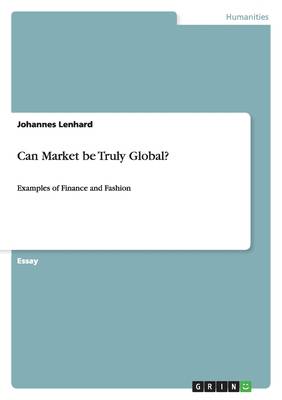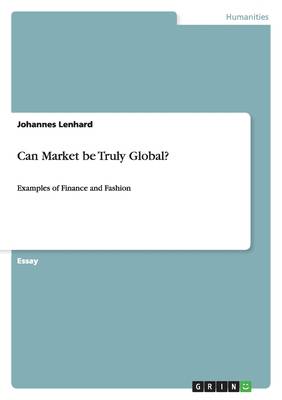
- Afhalen na 1 uur in een winkel met voorraad
- Gratis thuislevering in België vanaf € 30
- Ruim aanbod met 7 miljoen producten
- Afhalen na 1 uur in een winkel met voorraad
- Gratis thuislevering in België vanaf € 30
- Ruim aanbod met 7 miljoen producten
Zoeken
€ 19,45
+ 38 punten
Omschrijving
Essay from the year 2012 in the subject Sociology - Economy and Industry, grade: 2:1, London School of Economics, language: English, abstract: The recent economic and financial crisis seems to give an easy answer to the question whether markets can be truly global. How is it possible that German municipalities go bankrupt because they bought American mortgage papers other than by the force of a truly global market? The world is flat (Friedman, 2007) - so markets can not be anything but global. However, as we will try to show in this essay, bold statements as well as seemingly bold questions such as 'Can a market be truly global' need to be treated with caution. What does it mean to be 'truly global'? What after all is a 'market'? It is those issues that need to be addressed first. The paper will afterwards demonstrate the case of two examples of markets, namely fashion and finance. Analysing the globality of those very different types, we will try to show that it is firstly important to be attentive in regards to different parts of markets: for example, does the consumption side in the particular fashion market analysed seem to be much less global than the production side. It is secondly important to consider non-economic parts of the market when judging the degree of globalness: the seemingly global foreign exchange market in finance for instance is indeed very much 'embedded' into both social and material contexts which makes it what is called a 'global hybrid' below. It is nationally grounded but trades globally. The exemplary discussion of fashion and finance will afterwards be contextualised with a more general critical section illuminating the arguments of Marxists and sceptical school thinking before we come to a conclusion.
Specificaties
Betrokkenen
- Auteur(s):
- Uitgeverij:
Inhoud
- Aantal bladzijden:
- 24
- Taal:
- Engels
Eigenschappen
- Productcode (EAN):
- 9783656185703
- Verschijningsdatum:
- 11/05/2012
- Uitvoering:
- Paperback
- Formaat:
- Trade paperback (VS)
- Afmetingen:
- 140 mm x 216 mm
- Gewicht:
- 40 g

Alleen bij Standaard Boekhandel
+ 38 punten op je klantenkaart van Standaard Boekhandel
Beoordelingen
We publiceren alleen reviews die voldoen aan de voorwaarden voor reviews. Bekijk onze voorwaarden voor reviews.







